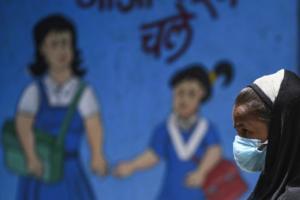Of the 3,276 children adopted in the country in 2017-18, a total of 1,858 were girls, the data showed

Photo used for representational purpose. Pic/AFP
Nearly 60 per cent of children adopted in the last six years were girls across states in India, led by Maharashtra which also recorded the highest number of adoptions in recent years, government data showed.
ADVERTISEMENT
Of the 3,276 children adopted in the country in 2017-18, a total of 1,858 were girls, the data showed.
In reply to an RTI filed by this correspondent on the number of adoptions in every state since 2012, Child Adoption Resource Authority (CARA) said Maharashtra was at the forefront in adopting girls.
The number of girls adopted in 2017 was 353 out of a total of 642 adoptions in Maharashtra.
Karnataka followed with 286 adoptions, 167 of them girls, CARA, the apex body for adoption in the country, said.
Maharashtra's high score was not just because of the size of the state, but because of the large number of adoption agencies there, said CARA CEO Lieutenant Colonel Deepak Kumar.
"Maharashtra has the highest number of adoption agencies in the country at 60 while other states that are bigger have on an average 20 adoption agencies," he told PTI.
In 2017-18, there was an increase in the number of in-country adoptions. Of the 3,276 children adopted within India, 1,858 were girls and 1,418 boys, according to the data given in response to the RTI query.
The inter-country adoption also saw an increase, with the number rising from 578 in 2016-17 to 651 in 2017-18. In 2017-18, most adoptions of Indian children were by families in the US, Italy, France and Spain, Kumar said.
In 2016-2017, out of the 3,210 children adopted within India, 1,915 or almost 60 per cent were girls.
Maharashtra (711) and Karnataka (252) again recorded the highest numbers, followed by West Bengal (203).
Data for the past five years showed that on an average, 59.77 per cent of couples adopted a girl and 40.23 per cent a boy.
"This reflects that things are changing now. Moreover, people feel that it is easier to manage a girl child than a boy, and that's another big plus point for the girl child to be considered for adoption," Kumar said.
Kumar refuted reports that more girls were adopted because many more of them were given away for adoption.
"It is not that availability of the girl child is higher but that parents are opting more for a girl child. We give them three choices - one can either opt for a girl or a boy or can give no preference...The percentage of those opting specifically for girls to boys would be 55:45," he said.
Similar trends were observed for the years since 2012, the period the RTI query focused on.
Of the 5,002 adoptions in 2012-13, 3,050 were girls, and of 4,354 in 2013-14, 2,601 were girls.
In 2014-15, 2,555 of the 4,362 children adopted were girls while in 2015-16, 2,295 of the 3,677 adopted were girls.
Even states with low sex ratios such as Haryana and Uttar Pradesh, couples were opting for adopting girls.
In Haryana, 31 girls and 19 boys were adopted while in Uttar Pradesh, 86 girls and 40 boys were adopted in 2016-17, according to the data.
The data come amid a recent report by NITI Aayog which said the sex ratio at birth (SRB) in India had seen a decline in 17 out of the 21 large states.
The report which stressed on the need to check sex-selective abortion said among the 17 states were those that recorded a substantial drop of 10 points or more.
In Gujarat the SRB fell to 854 females from 907 females per 1,000 males born, registering a drop of 53 points from 2012-14 (base year) to 2013-15 (reference year).
Kumar welcomed the trend of more girls being adopted, but also acknowledged issues related with adoption of children in India.
"In foreign countries, the domestic adoption process is through a lot of other programmes such as sponsorship and foster care. Many children who are in foster care are subsequently adopted. India also has a foster care programme but it has not really taken on because of the mindset of the people," Kumar said.
He said most people who wished to adopt children did not want a child who was older than 4 or 5 years of age.
"So the probability of a child getting adopted almost diminishes to negligible domestically if the child crosses the age of 5-6 years. I have 20,000 parents registered but we have very few children of a younger age who are legally free for adoption," he said.
The other issue was people's reluctance to adopt a child with special needs.
"We in India don't want to adopt a child with special needs while in foreign countries, people are open to it because they have a better healthcare facility and the government support is much higher," Kumar said.
Keep scrolling to read more news
Catch up on all the latest Crime, National, International and Hatke news here. Also download the new mid-day Android and iOS apps to get latest updates.
Mid-Day is now on Telegram. Click here to join our channel (@middayinfomedialtd) and stay updated with the latest news
This story has been sourced from a third party syndicated feed, agencies. Mid-day accepts no responsibility or liability for its dependability, trustworthiness, reliability and data of the text. Mid-day management/mid-day.com reserves the sole right to alter, delete or remove (without notice) the content in its absolute discretion for any reason whatsoever
 Subscribe today by clicking the link and stay updated with the latest news!" Click here!
Subscribe today by clicking the link and stay updated with the latest news!" Click here!







